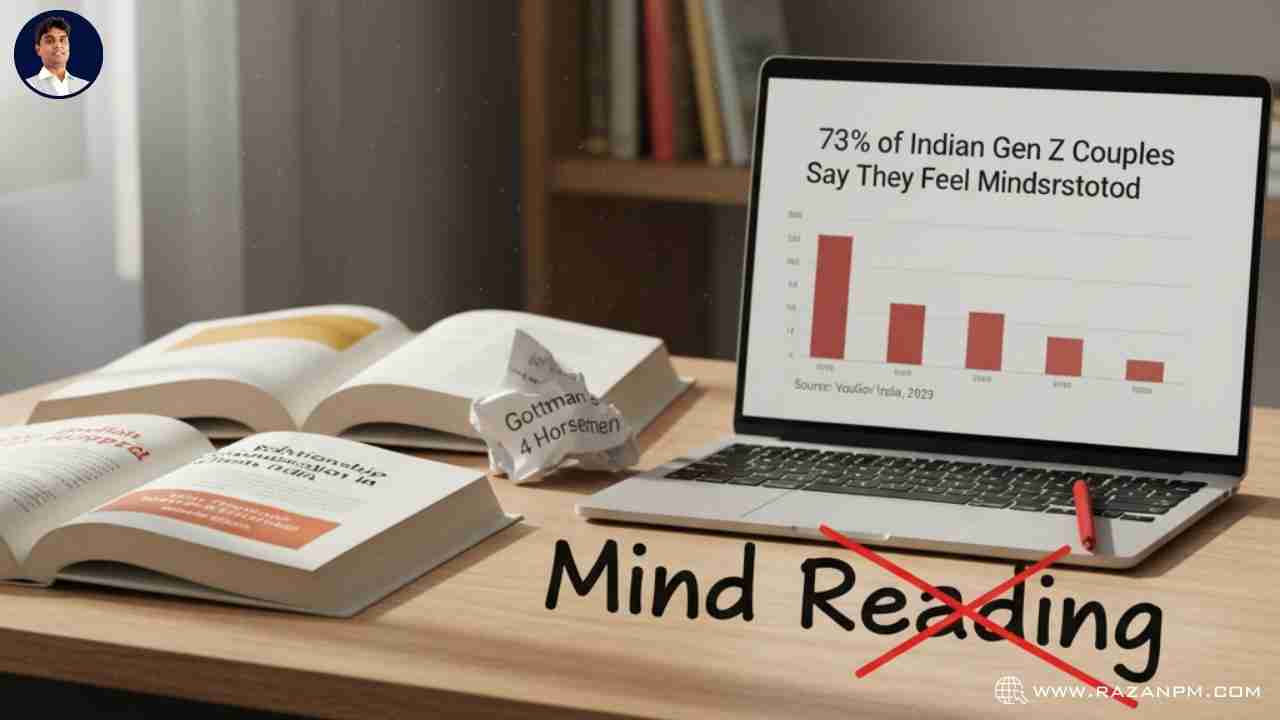“I didn’t tell him, but he should’ve known.”
Sounds familiar, right?
Let’s admit it — most of us have been there. You’re upset because your partner didn’t notice your silence. You expected them to “just know” something was wrong. But instead of comforting you, they carried on as if everything was normal.
And boom! — your mind starts its overthinking marathon:
“He doesn’t care about me anymore.”
“She’s changed… she doesn’t even notice my feelings.”
A tiny miscommunication turns into a spiral of negative thoughts, fear, and sometimes, emotional trauma.
As a Clinical Psychologist and Mind Healer, I’ve seen this pattern countless times in couples — small unspoken feelings turning into big emotional storms.
Let’s explore why this happens, and how to stop expecting your partner to be a mind reader.
also read: why quiet relationships often meandisconnection?
You think your partner should just know what you want — your mood, your triggers, your pain.
But when they don’t, it feels like rejection.
You pull away emotionally. They get confused.
And a silent distance begins to grow.
Here’s the truth — love doesn’t come with a built-in telepathy app.
Even the most emotionally intelligent partner cannot decode what’s never expressed.
Still, many people unconsciously expect it.
Why? Because deep down, we crave emotional attunement — that sense of “being seen and understood without words.”
also read: why gen z couples regret moving intoo soon?

...then you’re not alone.
These thoughts come from a place of emotional vulnerability — where expressing needs feels risky, so we expect understanding without words.
But when that doesn’t happen, disappointment builds, and our mind starts creating painful narratives.
Example:
Riya expected her partner, Arjun, to notice that she was anxious before a social event. Arjun, busy parking the car, didn’t realize it.
By the time they reached the party, Riya was withdrawn, thinking, “He doesn’t care about my feelings.”
In therapy, she later discovered — Arjun wasn’t ignoring her; he genuinely didn’t know.
Sound relatable? That’s how many emotional disconnects begin — not from lack of love, but from lack of clarity.
also read: how past trauma shapes your healthtoday?

1. Feel unheard even when your partner tries to help.
2. Often say, “Forget it, you won’t understand.”
3. Expect emotional gestures without asking for them.
4. Feel mentally exhausted after small misunderstandings.
5. Suppress feelings to “keep peace,” then explode later.
Over time, this pattern can create emotional distancing, resentment, and even anxiety symptoms — because the mind starts equating unmet expectations with rejection.
also read: 7 signs your addiction may be hidingdepression
From a clinical lens, this pattern often relates to Cognitive Distortions — especially Mind Reading and Emotional Reasoning.
According to the DSM-5 (Diagnostic and Statistical Manual of Mental Disorders), these thought errors are common in conditions like Generalized Anxiety Disorder (GAD) and Depressive Disorders, where the mind assumes what others think or feel without evidence.
In ICD-11, this falls under Maladaptive Cognitive Patterns, contributing to emotional dysregulation.
In simple terms —
When you believe “my partner should know,” you’re unknowingly practicing mind reading, a cognitive trap where we assume others think like us.
But they don’t — because they have their own emotional map.
also read: 5 ways couples reignite love after along break

A study from The Journal of Social and Personal Relationships (2019) found that couples who communicate their needs clearly report 35% higher relationship satisfaction compared to those who expect unspoken understanding.
Another Harvard Health study highlights that emotional miscommunication can trigger the same neural stress response as physical pain.
Yes — feeling misunderstood literally hurts your brain.
This is why open communication isn’t just healthy — it’s healing.
also read: how texting culture is changing genz relationships
Let me share a real (but anonymized) story from my therapy room.
A client once told me, “Sir, if he really loved me, he’d know what I’m feeling.”
She was heartbroken, angry, and emotionally drained.
During our sessions, we unpacked her childhood — she grew up in a home where expressing emotions wasn’t safe. Silence became her coping tool. She carried this belief into her marriage — that love means understanding without words.
One day, she said something that changed everything:
“I realized he’s not my mind reader… he’s my partner.”
When she began expressing her emotions openly — small changes started to happen.
Arguments reduced. Emotional intimacy grew.
She felt lighter — seen, heard, healed.
also read: the real psychology behind left onread anxiety

Here’s a simple, science-backed exercise you can do today — it’s called the “Emotion Naming Practice.”
1. When you feel hurt or upset, pause. Don’t react.
2. Write down what you wish your partner knew about your feelings.
3. Now, instead of expecting them to guess, express it calmly:
“I felt unseen when this happened. I just needed reassurance.”
4. Watch how this changes the energy of your conversation.
💬 Bonus Tip: Start with small emotional disclosures. “I felt lonely today,” is more powerful than silence.
When you name your emotions, you take away their power to control you. This creates clarity — and clarity builds connection.
also read: how disorders like insomnia fueldepression?
Of course, this is just the beginning.
Behind every emotional expectation lies years of learned patterns — from childhood attachment, family modeling, and past relationship trauma.
Undoing that wiring requires guided emotional work — something I help my clients achieve step by step.
So if you’ve ever found yourself thinking,
“Why doesn’t my partner understand me?”
Remember — they can, but not until you let them in.
also read: how isolation triggers illness anddepression together?
If this feels familiar, you don’t have to figure it out alone.
As a Clinical Psychologist and Mind Healer, I guide individuals and couples to break this cycle and rebuild emotional connection from the inside out.
Your feelings deserve words, not silence.
If you’re ready to start your healing journey —
👉 Book your consultation here (gentle reminder: one small step can change everything).
👉 Begin Your Journey with a 1 on 1 Consultation
👉 Begin Your Journey with a 1 on 1 Consultation

Because emotional awareness and communication styles differ. Most partners don’t ignore feelings intentionally — they simply can’t sense unspoken emotions. Learning to express emotions clearly helps bridge that gap.
also read: how to stop the cycle of pain anddepression?
Yes. Expecting mind reading creates emotional pressure and misunderstanding. Healthy relationships thrive on clear communication, not silent assumptions.
also read: what to do when i love you gets noreply?
Start with using “I feel” statements like “I feel unheard when…” instead of blaming. This invites empathy and open dialogue rather than conflict.
also read: how fear of rejection kills realconnection?
Constant arguments, silent treatment, emotional exhaustion, and feeling “unseen” are red flags that you and your partner may be missing emotional cues.
also read: why timing turns simple talks intobig arguments?
Absolutely. Therapy helps identify communication patterns, past emotional triggers, and attachment styles. It teaches both partners how to connect through clarity and empathy.
also read: how everyday pressure breaks yourmind?
Practice mindfulness, self-soothing, and honest communication. Instead of assuming rejection, express your need calmly — this prevents emotional burnout and strengthens connection.
also read: do voice notes kill realconversations?
